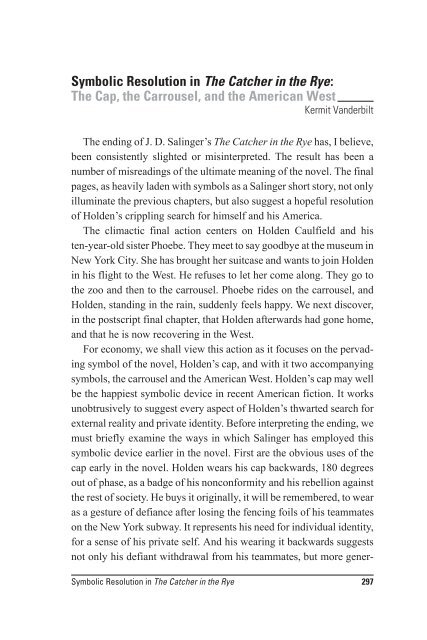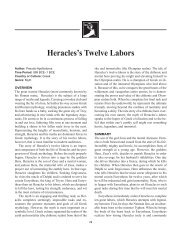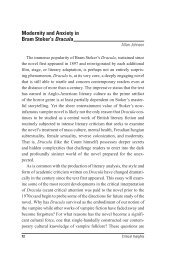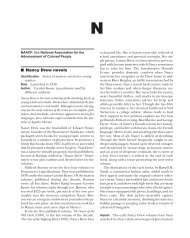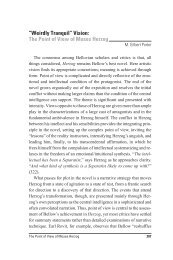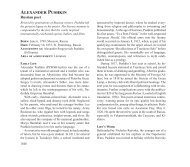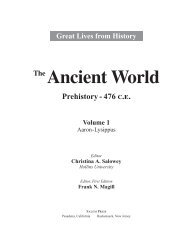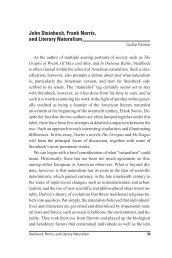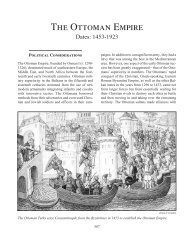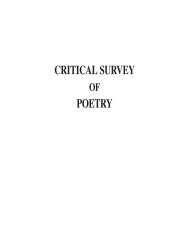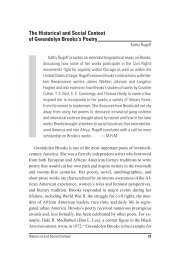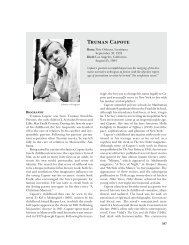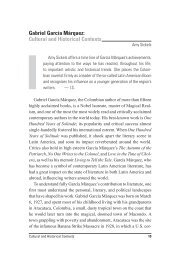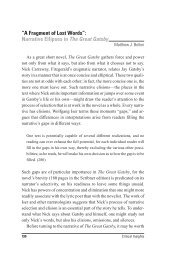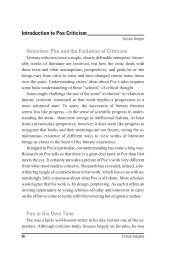Catcher in the Rye.vp - Salem Press
Catcher in the Rye.vp - Salem Press
Catcher in the Rye.vp - Salem Press
Create successful ePaper yourself
Turn your PDF publications into a flip-book with our unique Google optimized e-Paper software.
Symbolic Resolution <strong>in</strong> The <strong>Catcher</strong> <strong>in</strong> <strong>the</strong> <strong>Rye</strong>:<br />
The Cap, <strong>the</strong> Carrousel, and <strong>the</strong> American West<br />
Kermit Vanderbilt<br />
The end<strong>in</strong>g of J. D. Sal<strong>in</strong>ger’s The <strong>Catcher</strong> <strong>in</strong> <strong>the</strong> <strong>Rye</strong> has, I believe,<br />
been consistently slighted or mis<strong>in</strong>terpreted. The result has been a<br />
number of misread<strong>in</strong>gs of <strong>the</strong> ultimate mean<strong>in</strong>g of <strong>the</strong> novel. The f<strong>in</strong>al<br />
pages, as heavily laden with symbols as a Sal<strong>in</strong>ger short story, not only<br />
illum<strong>in</strong>ate <strong>the</strong> previous chapters, but also suggest a hopeful resolution<br />
of Holden’s crippl<strong>in</strong>g search for himself and his America.<br />
The climactic f<strong>in</strong>al action centers on Holden Caulfield and his<br />
ten-year-old sister Phoebe. They meet to say goodbye at <strong>the</strong> museum <strong>in</strong><br />
New York City. She has brought her suitcase and wants to jo<strong>in</strong> Holden<br />
<strong>in</strong> his flight to <strong>the</strong> West. He refuses to let her come along. They go to<br />
<strong>the</strong> zoo and <strong>the</strong>n to <strong>the</strong> carrousel. Phoebe rides on <strong>the</strong> carrousel, and<br />
Holden, stand<strong>in</strong>g <strong>in</strong> <strong>the</strong> ra<strong>in</strong>, suddenly feels happy. We next discover,<br />
<strong>in</strong> <strong>the</strong> postscript f<strong>in</strong>al chapter, that Holden afterwards had gone home,<br />
and that he is now recover<strong>in</strong>g <strong>in</strong> <strong>the</strong> West.<br />
For economy, we shall view this action as it focuses on <strong>the</strong> pervad<strong>in</strong>g<br />
symbol of <strong>the</strong> novel, Holden’s cap, and with it two accompany<strong>in</strong>g<br />
symbols, <strong>the</strong> carrousel and <strong>the</strong> American West. Holden’s cap may well<br />
be <strong>the</strong> happiest symbolic device <strong>in</strong> recent American fiction. It works<br />
unobtrusively to suggest every aspect of Holden’s thwarted search for<br />
external reality and private identity. Before <strong>in</strong>terpret<strong>in</strong>g <strong>the</strong> end<strong>in</strong>g, we<br />
must briefly exam<strong>in</strong>e <strong>the</strong> ways <strong>in</strong> which Sal<strong>in</strong>ger has employed this<br />
symbolic device earlier <strong>in</strong> <strong>the</strong> novel. First are <strong>the</strong> obvious uses of <strong>the</strong><br />
cap early <strong>in</strong> <strong>the</strong> novel. Holden wears his cap backwards, 180 degrees<br />
out of phase, as a badge of his nonconformity and his rebellion aga<strong>in</strong>st<br />
<strong>the</strong> rest of society. He buys it orig<strong>in</strong>ally, it will be remembered, to wear<br />
as a gesture of defiance after los<strong>in</strong>g <strong>the</strong> fenc<strong>in</strong>g foils of his teammates<br />
on <strong>the</strong> New York subway. It represents his need for <strong>in</strong>dividual identity,<br />
for a sense of his private self. And his wear<strong>in</strong>g it backwards suggests<br />
not only his defiant withdrawal from his teammates, but more gener-<br />
Symbolic Resolution <strong>in</strong> The <strong>Catcher</strong> <strong>in</strong> <strong>the</strong> <strong>Rye</strong> 297
ally, his basically recessive tendencies. He wants to retreat backward<br />
<strong>in</strong>to <strong>the</strong> world he is leav<strong>in</strong>g—that of childhood <strong>in</strong>nocence—ra<strong>the</strong>r than<br />
advance <strong>in</strong>to adolescence, maturity, and <strong>the</strong> world of adult American<br />
society. Aga<strong>in</strong>, <strong>the</strong> cap suggests his yearn<strong>in</strong>g for <strong>in</strong>nocence because, as<br />
a reversed cap, it becomes also a baseball cap—specifically <strong>the</strong><br />
catcher’s. Hence Holden’s misquot<strong>in</strong>g <strong>the</strong> Burns poem and fancy<strong>in</strong>g<br />
himself <strong>the</strong> catcher <strong>in</strong> <strong>the</strong> rye, a companion and protector of children <strong>in</strong><br />
<strong>the</strong>ir everlast<strong>in</strong>gly <strong>in</strong>nocent field of rye. As a catcher’s cap it carries us<br />
even more <strong>in</strong>timately <strong>in</strong>to Holden’s ra<strong>the</strong>r disturbed psyche. The red<br />
cap ties him closely with his idealized younger bro<strong>the</strong>r, <strong>the</strong> red-haired<br />
Allie, who played baseball and wrote poems <strong>in</strong> green <strong>in</strong>k on his baseball<br />
glove. The possibility here is that Holden is do<strong>in</strong>g more than<br />
merely try<strong>in</strong>g to evade <strong>the</strong> reality of his own adolescence, or even to rega<strong>in</strong><br />
his lost bro<strong>the</strong>r (recall his guilty conversations with Allie when he<br />
becomes very depressed). Through <strong>the</strong> reversed baseball cap, he presumably<br />
is identify<strong>in</strong>g himself with his dead bro<strong>the</strong>r Allie. Sal<strong>in</strong>ger<br />
drops h<strong>in</strong>ts which <strong>the</strong> amateur psychologist can hardly miss. He describes<br />
<strong>the</strong> traumatic shock which Holden experienced when Allie<br />
died of leukemia. Obviously despair<strong>in</strong>g at <strong>the</strong> cosmic <strong>in</strong>justice of such<br />
an early death, <strong>the</strong> highly sensitive Holden punched his fist through all<br />
<strong>the</strong> w<strong>in</strong>dows of <strong>the</strong> Caulfield garage and broke his hand. In his cont<strong>in</strong>u<strong>in</strong>g<br />
identification with Allie (as well as his strong preoccupation with<br />
<strong>the</strong> equally idealistic James Castle, who committed suicide at Elkton<br />
Hills school), Holden can be <strong>in</strong>terpreted as seek<strong>in</strong>g, <strong>in</strong> an ultimate<br />
regression, <strong>the</strong> comfort of death itself. This will be <strong>the</strong> only successful<br />
release from <strong>the</strong> agoniz<strong>in</strong>g complexities of a mutable and deceitful<br />
world.<br />
The circumstances surround<strong>in</strong>g and issu<strong>in</strong>g from Allie’s death <strong>the</strong>n,<br />
ra<strong>the</strong>r than <strong>the</strong> phon<strong>in</strong>ess of <strong>the</strong> prep school and American society at<br />
large, are quite clearly set forth as <strong>the</strong> important, underly<strong>in</strong>g cause of<br />
Holden’s present maladjustment. 1 Had Sal<strong>in</strong>ger <strong>in</strong>tended Holden to be<br />
<strong>the</strong> young social critic par excellence he would scarcely have supplied<br />
Holden with this private childhood trauma and overly charged emo-<br />
298 Critical Insights
tional equipment for his entry <strong>in</strong>to <strong>the</strong> world of adolescence. By <strong>the</strong><br />
time of <strong>the</strong> present action <strong>in</strong> <strong>the</strong> novel, <strong>the</strong> schizophrenia, or “phon<strong>in</strong>ess,”<br />
of American society, which Holden does rightly sense, has become<br />
<strong>the</strong> correlative and secondary cause of his own exaggerated<br />
schizoid tendencies. And so, with a dim awareness of his sickness, but<br />
not its primary sources, Holden frequently refers to himself as a “madman,”<br />
while all occasions <strong>in</strong> American life <strong>in</strong>form aga<strong>in</strong>st him and<br />
conspire to drive him “crazy,” as he says. In what enlarges to a<br />
world-destruction fantasy, he broods over <strong>the</strong> <strong>in</strong>security of <strong>the</strong> ducks <strong>in</strong><br />
w<strong>in</strong>ter, and cl<strong>in</strong>gs to symbols of security and changelessness: <strong>the</strong> monastic<br />
life, <strong>the</strong> serene nuns amid <strong>the</strong> circus atmosphere of Grand Central<br />
Station, and more clearly fus<strong>in</strong>g with his concern with death, <strong>the</strong><br />
Egyptian mummies and <strong>the</strong> Indian figures <strong>in</strong> <strong>the</strong> museum. Phoebe’s <strong>in</strong>tuition<br />
about Holden’s paranoid symptoms (he even suspects courageous<br />
lawyers of disguis<strong>in</strong>g base motives of self-aggrandizement) expresses<br />
itself <strong>in</strong> her simple statement to Holden, “You don’t like<br />
anyth<strong>in</strong>g that’s happen<strong>in</strong>g. . . . Name one th<strong>in</strong>g.” After long mus<strong>in</strong>g,<br />
Holden replies, “I like Allie.” Phoebe, with unwitt<strong>in</strong>g accuracy, po<strong>in</strong>ts<br />
next to Holden’s private obsession with death by simply rem<strong>in</strong>d<strong>in</strong>g<br />
him, “Allie’s dead.” 2<br />
Partly through <strong>the</strong> concentration of symbolic mean<strong>in</strong>gs <strong>in</strong> <strong>the</strong> cap,<br />
<strong>the</strong>n, Sal<strong>in</strong>ger has created a complex adolescent whose ambition to be<br />
a catcher <strong>in</strong> <strong>the</strong> rye has to be understood from a wider frame of reference<br />
than that of a muck-rak<strong>in</strong>g “problem” novel about social conformity<br />
<strong>in</strong> midcentury America. By first relat<strong>in</strong>g Holden’s sickness to<br />
Allie’s death, Sal<strong>in</strong>ger dissociates Holden from <strong>the</strong> immediate social<br />
environment. Then ra<strong>the</strong>r than his be<strong>in</strong>g psychoanalyzed after Allie’s<br />
death, as his parents had briefly considered, this young Raskolnikov is<br />
forced to discover his unlikely redemption <strong>in</strong> <strong>the</strong> world, first <strong>in</strong> <strong>the</strong><br />
morally dishonest associations of <strong>the</strong> American prep school at Elkton<br />
Hills, Whooton, and Pencey Prep; and <strong>the</strong>n <strong>in</strong> his odyssey through<br />
New York City. In short, Holden’s private salvation, his return to<br />
wholeness, must come, if it does come, through a deepened moral vi-<br />
Symbolic Resolution <strong>in</strong> The <strong>Catcher</strong> <strong>in</strong> <strong>the</strong> <strong>Rye</strong> 299
sion which can reconcile him to his world. He can <strong>the</strong>n stop try<strong>in</strong>g on<br />
caps—<strong>the</strong> desperate and futile gestures of adolescent self-discovery.<br />
It is through <strong>the</strong> <strong>in</strong>nocent Phoebe, at <strong>the</strong> end, that Holden <strong>in</strong>itially<br />
moves toward this redemption. As she is runn<strong>in</strong>g to meet him at <strong>the</strong><br />
museum, he sees her because she is wear<strong>in</strong>g his red duck-hunt<strong>in</strong>g<br />
cap—his “people-shoot<strong>in</strong>g” ra<strong>the</strong>r than duck-shoot<strong>in</strong>g cap. He had<br />
given her <strong>the</strong> cap after he had decided to leave New York, vaguely to<br />
hitchhike to <strong>the</strong> West. Phoebe, he discovers, has packed her suitcase<br />
and now asks if she can flee with him. Sal<strong>in</strong>ger describes Holden’s<br />
sudden reaction: “I almost fell over when she said that. I swear to God I<br />
did. I got sort of dizzy and I thought I was go<strong>in</strong>g to pass out or someth<strong>in</strong>g<br />
aga<strong>in</strong>” (185). For <strong>the</strong> first time <strong>in</strong> <strong>the</strong> novel, he has begun to realize<br />
that <strong>the</strong> idea of wholesale retreat from human associations must be<br />
re-exam<strong>in</strong>ed. He discovers that he does not want to save this young <strong>in</strong>nocent<br />
from <strong>the</strong> phon<strong>in</strong>ess and obscenity of New York City. Disappo<strong>in</strong>ted<br />
and angry, Phoebe hurls <strong>the</strong> cap at Holden. He puts <strong>the</strong> cap not<br />
on his head but <strong>in</strong>to his pocket. Phoebe <strong>the</strong>n walks ahead of him to <strong>the</strong><br />
zoo, where Holden is able briefly to observe <strong>the</strong> animals all safe and<br />
well-fed <strong>in</strong> w<strong>in</strong>ter. Next <strong>the</strong>y arrive at <strong>the</strong> carrousel. Holden’s m<strong>in</strong>d<br />
now fixes on <strong>the</strong> significance of <strong>the</strong> carrousel.<br />
First, <strong>the</strong> carrousel comforts Holden because he discovers here a<br />
permanent and secure spot <strong>in</strong> New York, specifically because <strong>in</strong> <strong>the</strong><br />
fixed center comes <strong>the</strong> same old song year after year. His earlier preoccupation<br />
with change and death is still active. And it becomes more<br />
highly charged as Phoebe climbs up onto <strong>the</strong> carrousel and it beg<strong>in</strong>s to<br />
whirl. He sees <strong>the</strong> <strong>in</strong>nocent children <strong>in</strong> danger of fall<strong>in</strong>g from <strong>the</strong> circl<strong>in</strong>g<br />
carrousel as <strong>the</strong>y reach for <strong>the</strong> stationary gold r<strong>in</strong>g. But <strong>the</strong> moment<br />
suddenly becomes also, for Holden, <strong>the</strong> <strong>in</strong>stant of revelation. He<br />
reflects,<br />
The th<strong>in</strong>g with kids is, if <strong>the</strong>y want to grab for <strong>the</strong> gold r<strong>in</strong>g, you have to let<br />
<strong>the</strong>m do it, and not say anyth<strong>in</strong>g. If <strong>the</strong>y fall off, <strong>the</strong>y fall off, but it’s bad if<br />
you say anyth<strong>in</strong>g to <strong>the</strong>m. (190)<br />
300 Critical Insights
Then between rides, Phoebe comes over to Holden, gives him a kiss, it<br />
starts to ra<strong>in</strong>, she puts his cap back on his head and <strong>the</strong>n returns to take<br />
her chances on <strong>the</strong> turn<strong>in</strong>g carrousel aga<strong>in</strong>. As Holden watches, stand<strong>in</strong>g<br />
<strong>in</strong> <strong>the</strong> downpour with his cap on, he is suddenly overwhelmed with<br />
happ<strong>in</strong>ess:<br />
My hunt<strong>in</strong>g hat really gave me quite a lot of protection, <strong>in</strong> a way, but I got<br />
soaked anyway. I didn’t care, though. I felt so damn happy all of a sudden,<br />
<strong>the</strong> way old Phoebe kept go<strong>in</strong>g around and around. (191)<br />
The novel proper closes on this scene. The carrousel has suggested<br />
to Holden <strong>the</strong> dangers and <strong>in</strong>securities <strong>in</strong> life which children must risk<br />
as <strong>the</strong>y grow up and reach for <strong>the</strong>ir fixed star. The ride has its perils, but<br />
all children must risk <strong>the</strong>m. One cannot make life stand still <strong>in</strong> an eternal<br />
moment of childhood <strong>in</strong>nocence. The carrousel, with all of its dangers,<br />
however, still has a fixed center—an unchang<strong>in</strong>g music <strong>in</strong> <strong>the</strong><br />
midst of external movement, a still po<strong>in</strong>t <strong>in</strong> <strong>the</strong> turn<strong>in</strong>g world. 3 In this<br />
confront<strong>in</strong>g of reality, Holden has begun to lose his delusional obsession<br />
to be a catcher <strong>in</strong> <strong>the</strong> rye. There can be no protector to break <strong>the</strong><br />
fall from <strong>in</strong>nocence <strong>in</strong>to adolescence and maturity. Holden also decl<strong>in</strong>es<br />
<strong>the</strong> gesture of wear<strong>in</strong>g his red hunt<strong>in</strong>g cap backwards while forestall<strong>in</strong>g<br />
his own progress <strong>in</strong>to maturity. When Phoebe has placed <strong>the</strong><br />
cap on Holden’s head, he does not sw<strong>in</strong>g it around to <strong>the</strong> back. Nor<br />
does he retreat for cover from <strong>the</strong> ra<strong>in</strong> which falls here almost as a baptismal<br />
downpour at Holden’s moment of illum<strong>in</strong>ation. And he realizes<br />
that <strong>the</strong> cap, his pseudo-identity and gesture of escape from life, provides,<br />
at best, only a partial protection from <strong>the</strong> unexpected drench<strong>in</strong>g.<br />
But <strong>the</strong> end<strong>in</strong>g is not quite so pat. Holden’s ordeal is not yet over. Earlier,<br />
<strong>the</strong> reader has seen <strong>the</strong> merg<strong>in</strong>g of manic and depressive states <strong>in</strong> <strong>the</strong><br />
unstable young hero. Without know<strong>in</strong>g why, dur<strong>in</strong>g a moment of depression,<br />
Holden will suddenly beg<strong>in</strong> “hors<strong>in</strong>g around.” After <strong>the</strong> brutal<br />
physical assault by Maurice, <strong>the</strong> pimp elevator-operator at <strong>the</strong> Edmont<br />
Hotel, Holden’s spirit is momentarily shattered; <strong>the</strong>n suddenly, he goes<br />
Symbolic Resolution <strong>in</strong> The <strong>Catcher</strong> <strong>in</strong> <strong>the</strong> <strong>Rye</strong> 301
<strong>in</strong>to a manic Hollywood act, identify<strong>in</strong>g himself with a wounded gunman<br />
<strong>in</strong> a gangster movie. Shortly <strong>the</strong>reafter, acute depression returns<br />
and he contemplates suicide. Aga<strong>in</strong>, after call<strong>in</strong>g Sally Hayes a foul<br />
name, Holden admits that he felt bad; but <strong>the</strong>n “all of a sudden, I did<br />
someth<strong>in</strong>g I shouldn’t have. I laughed” (122). And at <strong>the</strong> end, while describ<strong>in</strong>g<br />
Phoebe on <strong>the</strong> whirl<strong>in</strong>g carrousel, Holden remarks, “I was<br />
damn near bawl<strong>in</strong>g, I felt so damn happy, if you want to know <strong>the</strong> truth. I<br />
don’t know why” (191). His discovery of who he is rema<strong>in</strong>s imperfect,<br />
just as his reunion with society yet rema<strong>in</strong>s to be achieved.<br />
II<br />
And so Holden does go to <strong>the</strong> American West, <strong>the</strong>re to recover both<br />
his physical and mental well-be<strong>in</strong>g. Several critics, by pass<strong>in</strong>g over <strong>the</strong><br />
previous scene, have read this last chapter as an ironic commentary on<br />
Holden’s f<strong>in</strong>al helplessness <strong>in</strong> <strong>the</strong> face of modernism, phon<strong>in</strong>ess, and<br />
psycho<strong>the</strong>rapy. Three of <strong>the</strong>se critics, all hav<strong>in</strong>g used Huck F<strong>in</strong>n as<br />
touchstone, arrive at a remarkably happy agreement about Holden’s<br />
imm<strong>in</strong>ent surrender to <strong>the</strong> forces of evil <strong>in</strong> American society:<br />
Ironically, he is revealed as tell<strong>in</strong>g us his narrative from an <strong>in</strong>stitution of<br />
some k<strong>in</strong>d—psychiatric, we are led to suspect—hav<strong>in</strong>g also been trapped<br />
by <strong>the</strong> people who want to “sivilize” him. 4<br />
Supremely ironical, <strong>the</strong>n, is our last glimpse of Holden mak<strong>in</strong>g recovery<br />
and adjustment <strong>in</strong> <strong>the</strong> sanitarium—a prelude to compromise <strong>in</strong> <strong>the</strong> outside<br />
world. . . . Modern <strong>the</strong>rapy takes over, Holden will return. For Holden’s<br />
sake we wouldn’t have it o<strong>the</strong>rwise, even though it’s a return to <strong>the</strong> big<br />
money and dopey newsreels. 5<br />
And we can see, on <strong>the</strong> f<strong>in</strong>al note of irony <strong>in</strong> <strong>the</strong> book, that that frontier<br />
West which represented escape from “sivilization” for Huckleberry F<strong>in</strong>n<br />
has ended by becom<strong>in</strong>g <strong>the</strong> symbol for depravity and phon<strong>in</strong>ess <strong>in</strong> our national<br />
shr<strong>in</strong>e at Hollywood. 6<br />
302 Critical Insights
Perhaps if we look at what Sal<strong>in</strong>ger has actually written <strong>in</strong> this f<strong>in</strong>al<br />
chapter, we may f<strong>in</strong>d that <strong>the</strong> outlook for Holden is not quite this bleak.<br />
Certa<strong>in</strong> signs can be taken as encourag<strong>in</strong>g. The first is Holden’s response<br />
to <strong>the</strong> psychoanalyst, who has asked Holden if he is go<strong>in</strong>g to<br />
change and apply himself <strong>in</strong> school dur<strong>in</strong>g <strong>the</strong> com<strong>in</strong>g autumn. Holden<br />
answers like <strong>the</strong> common-sense American frontiersman of old:<br />
It’s such a stupid question, <strong>in</strong> my op<strong>in</strong>ion. I mean how do you know what<br />
you’re go<strong>in</strong>g to do till you do it? The answer is, you don’t. I th<strong>in</strong>k I am, but<br />
how do I know? I swear it’s a stupid question. (192)<br />
Despite Hollywood, modern psychoanalysis, and power of positive<br />
th<strong>in</strong>k<strong>in</strong>g around him, Holden <strong>in</strong> <strong>the</strong> West is beg<strong>in</strong>n<strong>in</strong>g to face reality <strong>in</strong><br />
<strong>the</strong> pragmatic frontier spirit and <strong>in</strong>tends to discover his private, workable<br />
solutions to life <strong>in</strong> America. As <strong>the</strong> children on <strong>the</strong> carrousel must<br />
do, he will live through his experience as it comes. What he th<strong>in</strong>ks he<br />
should do—his private idealism—will be put to <strong>the</strong> test of American<br />
pragmatism, what he does and must do.<br />
The second encourag<strong>in</strong>g sign appears <strong>in</strong> Holden’s reaction to his<br />
Hollywood bro<strong>the</strong>r D. B.’s question: what does Holden th<strong>in</strong>k about his<br />
recent crisis? Aga<strong>in</strong>, Holden does not <strong>in</strong>tellectualize his problem. But<br />
he makes a confession that po<strong>in</strong>ts to an advance over his previous gestures<br />
of rebellion and retreat, as well as his unsuccessful attempts to<br />
break through <strong>the</strong> wall of phon<strong>in</strong>ess <strong>in</strong> American society to achieve<br />
love and community. He recognizes <strong>the</strong> need for a balance between <strong>the</strong><br />
size of <strong>the</strong> head (Professor Antol<strong>in</strong>i’s earlier emphasis) and <strong>the</strong> size of<br />
<strong>the</strong> heart. What Holden says at <strong>the</strong> close is, “About all I know is, I sort<br />
of miss everybody I told about. Even old Stradlater and Ackley, for <strong>in</strong>stance.<br />
I th<strong>in</strong>k I even miss that goddam Maurice” (192). The prospect<br />
for Holden is that he may now be able to give people a “buzz” on <strong>the</strong><br />
phone and achieve communication. 7<br />
If Holden’s comments at <strong>the</strong> end po<strong>in</strong>t <strong>the</strong> way out of sickness and<br />
<strong>in</strong>to wholeness, one can only assume that Sal<strong>in</strong>ger has placed his hero <strong>in</strong><br />
Symbolic Resolution <strong>in</strong> The <strong>Catcher</strong> <strong>in</strong> <strong>the</strong> <strong>Rye</strong> 303
<strong>the</strong> vaguely def<strong>in</strong>ed West for <strong>the</strong> same reason that Mark Twa<strong>in</strong>, with<br />
similar vagueness, <strong>in</strong> Huckleberry F<strong>in</strong>n, held out <strong>the</strong> promise of a revitaliz<strong>in</strong>g<br />
West for an even younger American <strong>in</strong>dividualist. Both writers<br />
at <strong>the</strong> end are work<strong>in</strong>g not on <strong>the</strong> level of realism but on <strong>the</strong> lower stratum<br />
of American myth. What Sal<strong>in</strong>ger suggests <strong>in</strong> his f<strong>in</strong>al page is that,<br />
while <strong>the</strong> America represented for Holden by Pencey Prep, New York<br />
City, and even <strong>the</strong> new West, is a far cry from <strong>the</strong> pastoral America<br />
which Holden periodically has cherished <strong>in</strong> fantasy, still that earlier<br />
spirit of self-knowledge through private action and self-reliance endures<br />
unchanged to serve as a source of emotional strength to young Americans.<br />
Holden’s reaction to <strong>the</strong> psychiatrist’s question tells us that he, at<br />
least, will not be poured forthwith <strong>in</strong>to <strong>the</strong> modern mould of Ivy-League<br />
conformity and Madison Avenue commercialism. And second, Holden,<br />
like that earlier New York transcendentalist, Walt Whitman, has recognized<br />
too <strong>the</strong> “hollowness at heart” of an urban society shot through with<br />
every form of “deceit <strong>in</strong> <strong>the</strong> spirit”; and yet Holden at <strong>the</strong> end, also like<br />
Whitman, is able to affirm a social bro<strong>the</strong>rhood with <strong>the</strong> complex humanity<br />
of men. Why should we <strong>in</strong>vite ourselves to lament this pass<strong>in</strong>g of<br />
a naïve idealism and, <strong>in</strong> effect, to have Holden rema<strong>in</strong> little more than a<br />
modern, uncompromis<strong>in</strong>g Young Goodman Brown? 8<br />
Through <strong>the</strong> symbols of <strong>the</strong> cap, <strong>the</strong> carrousel, and <strong>the</strong> American<br />
West, Sal<strong>in</strong>ger traces on <strong>the</strong> f<strong>in</strong>al pages Holden’s first steps on <strong>the</strong> way<br />
to his discovery of a new life. Whe<strong>the</strong>r this symbolic end<strong>in</strong>g tries to imply<br />
too much while render<strong>in</strong>g too little is not <strong>the</strong> issue here. What is important<br />
is that <strong>the</strong> symbols need to be adequately accounted for if we are<br />
to know what <strong>the</strong> novel has f<strong>in</strong>ally tried to say. I have suggested that <strong>the</strong>y<br />
re<strong>in</strong>force each o<strong>the</strong>r and po<strong>in</strong>t <strong>the</strong> way to Holden’s redemption <strong>in</strong>to life<br />
ra<strong>the</strong>r than alienation and withdrawal from it. His too-<strong>in</strong>nocent idealism<br />
has begun to give way to <strong>the</strong> hopeful beg<strong>in</strong>n<strong>in</strong>gs of maturity and a saner<br />
view both of himself and of <strong>the</strong> America <strong>in</strong> which he must live.<br />
From Western Humanities Review 17.3 (Summer 1963): 271-277. Copyright © 1963 by Western<br />
Humanities Review. Repr<strong>in</strong>ted with permission of Western Humanities Review.<br />
304 Critical Insights
Notes<br />
1. The sociologically oriented reader is doubtless tempted to relate Holden’s <strong>in</strong>stability<br />
to ano<strong>the</strong>r cause, <strong>the</strong> Caulfield’s ra<strong>the</strong>r improvised homelife—<strong>the</strong> mo<strong>the</strong>r be<strong>in</strong>g<br />
a cha<strong>in</strong>-smok<strong>in</strong>g <strong>in</strong>somniac and <strong>the</strong> fa<strong>the</strong>r an ex-Catholic and peripatetic lawyer. But<br />
Sal<strong>in</strong>ger nei<strong>the</strong>r suggests that this home environment is abnormal <strong>in</strong> our time nor that it<br />
has played a decisive part <strong>in</strong> mould<strong>in</strong>g Holden’s acutely sensitive reactions to <strong>the</strong><br />
world. In virtually all of Sal<strong>in</strong>ger’s fiction, for that matter, <strong>the</strong> parents are relegated to a<br />
humiliat<strong>in</strong>g role of <strong>in</strong>significance <strong>in</strong> <strong>the</strong> lives of <strong>the</strong>ir precocious children.<br />
2. The <strong>Catcher</strong> <strong>in</strong> <strong>the</strong> <strong>Rye</strong> (New York, 1953), pp. 153, 154. All subsequent quotations<br />
are taken from this edition.<br />
3. Two <strong>in</strong>terpretations of <strong>the</strong> carrousel present a less optimistic view of Holden’s<br />
progress. Edgar Branch writes that <strong>the</strong> carrousel “goes round and round, go<strong>in</strong>g nowhere—a<br />
dynamic moment of happy, static immaturity eternalized <strong>in</strong> his m<strong>in</strong>d.”<br />
(“Mark Twa<strong>in</strong> and J. D. Sal<strong>in</strong>ger: A Study <strong>in</strong> Literary Cont<strong>in</strong>uity,” American Quarterly,<br />
IX, Summer, 1957, 149.) Arthur Heiserman and James E. Miller, Jr., hold out<br />
even less hope for Holden: “So at <strong>the</strong> end, like <strong>the</strong> hero of Antic Hay, Holden delights<br />
<strong>in</strong> circles—a comfort<strong>in</strong>g, bounded figure which yet connotes hopelessness. . . . From<br />
that lunatic delight <strong>in</strong> a circle, he is shipped off to <strong>the</strong> psychiatrist. For Holden loves<br />
<strong>the</strong> world more than <strong>the</strong> world can bear.” (“J. D. Sal<strong>in</strong>ger: Some Crazy Cliff,” Western<br />
Humanities Review, X, Spr<strong>in</strong>g, 1956, 131.)<br />
4. Charles Kaplan, “Holden and Huck: The Odysseys of Youth,” College English,<br />
XVIII (November, 1956), 78.<br />
5. Branch, op. cit., p. 156.<br />
6. Heiserman and Miller, op. cit., p. 134.<br />
7. Critical op<strong>in</strong>ion here aga<strong>in</strong> has <strong>in</strong>sisted that Holden rema<strong>in</strong>s a confirmed isolate<br />
at <strong>the</strong> end of <strong>the</strong> book. Alfred Kaz<strong>in</strong> <strong>in</strong>cludes Holden <strong>in</strong> <strong>the</strong> sweep<strong>in</strong>g pronouncement<br />
that “<strong>in</strong> Sal<strong>in</strong>ger’s work <strong>the</strong> two estates—<strong>the</strong> world and <strong>the</strong> cutely sensitive<br />
young—never really touch at all.” (“J. D. Sal<strong>in</strong>ger: ‘Everybody’s Favorite,’” repr<strong>in</strong>ted<br />
<strong>in</strong> Contemporaries, Boston, 1962, p. 238.) For Maxwell Geismar, Holden’s statements<br />
represent <strong>the</strong> smugly removed “peak of well-to-do and neurotic anarchism.” (“J. D.<br />
Sal<strong>in</strong>ger: The Wise Child and <strong>the</strong> New Yorker School of Fiction,” <strong>in</strong> American Moderns:<br />
From Rebellion to Conformity, New York, 1958.) Peter J. Seng, o<strong>the</strong>rwise perceptive<br />
<strong>in</strong> not<strong>in</strong>g Holden’s obvious <strong>in</strong>capacity to act as an arbiter of moral values <strong>in</strong> an<br />
adult society, <strong>in</strong>sists that Holden at <strong>the</strong> end is <strong>the</strong> tragic author of his own undo<strong>in</strong>g.<br />
Holden’s “flaw” resides <strong>in</strong> “a naïve refusal to come to terms with <strong>the</strong> world <strong>in</strong> which he<br />
lives.” (“The Fallen Idol: The Immature World of Holden Caulfield,” College English,<br />
XXIII, December, 1961, 209.)<br />
8. Authors Heiserman and Miller, op. cit., p. 137, come ra<strong>the</strong>r close to such a conclusion:<br />
“As we leave Holden alone <strong>in</strong> his room <strong>in</strong> <strong>the</strong> psychiatric ward, we are aware<br />
of <strong>the</strong> book’s last ironic <strong>in</strong>congruity. It is not Holden who should be exam<strong>in</strong>ed for a<br />
sickness of <strong>the</strong> m<strong>in</strong>d, but <strong>the</strong> world <strong>in</strong> which he has sojourned and found himself an<br />
alien. To ‘cure’ Holden, he must be given <strong>the</strong> contagious, almost universal disease of<br />
phony adultism; he must be pushed over that ‘crazy cliff.’”<br />
Symbolic Resolution <strong>in</strong> The <strong>Catcher</strong> <strong>in</strong> <strong>the</strong> <strong>Rye</strong> 305


